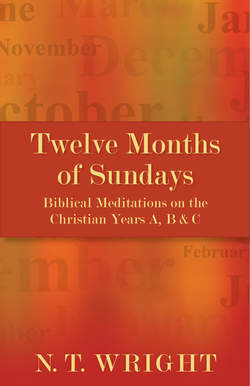Читать книгу Twelve Months of Sundays - N.T. Wright - Страница 9
На сайте Литреса книга снята с продажи.
ОглавлениеThe First Sunday of Advent
Isaiah 2.1–5
Romans 13.11–14
Matthew 24.36–44
With the lectionary’s new year comes St Matthew, with warnings about the days of Noah. Noah’s solitary gospel cameo; he doesn’t feature much in the epistles, either. Why not?
The point about Noah’s days is that they were ordinary. Eating, drinking, family life as usual; no signs, no hint of what is to happen. This contrasts with the previous verses, where detailed signs herald Jerusalem’s destruction; some suggest that this is a different ‘day and hour’, the second coming itself, which might occur at any time, not necessarily after a generation. Alternatively, these warnings too can be interpreted as relating to Jerusalem’s fall, but as referring narrowly to the specific moment of calamity.
From early days, however, Christians have read this text as referring to the ultimate future, the day for which even AD 70 was just a rehearsal, the day when some will be ‘taken’ (in judgement) and others ‘left’ (in mercy). If we wish to read the text this way, however, we must temper it with the emphasis of Paul: do not suppose that you are at the moment simply in darkness, with nothing to do before the great day arrives. The day has already begun to dawn with the coming of Jesus, so that Jesus’ followers are already people of the day. The promise – and warning – of God’s future is meant to inculcate neither helplessness nor complacency, but rather energy to work as day-people in a world that thinks it’s still night.
Paul has his own detailed agenda of what this will mean. No night-behaviour: many of the sins he lists in v. 13 may have been nocturnal in Rome, but his point is clearly metaphorical, since quarrelling and jealousy keep no special hours. Those who clothe themselves with the Lord of the day must renounce all such behaviour; sinful practices, particularly those of the flesh, will shriek that it’s unnatural to say ‘no’ to them, but once the day has dawned the shadows cannot dictate to the sunlight, nor the nightmares to the morning’s tasks.
For Paul, then, the great event for which Israel had longed had already arrived in Jesus. This means that prophecies like Isaiah 2 are already brought to birth in God’s reality. Paul saw his own mission to the Gentiles as the fulfilment of Isaiah’s promise: the nations were already coming in to God’s people, to hear the message of salvation that the creator God had entrusted to the Jews, and had fulfilled in the Jewish Messiah. Isaiah’s promise of universal peace must therefore be read, like Paul’s call to personal holiness, as our present agenda. We must neither look helplessly at a dark and sleeping world, nor think complacently that we, the church, are all right as we are. We must wake people up to the fact that the sun is already shining, and that the judge of the nations is at the door, longing to see his justice and peace enfold the world in a single embrace.
